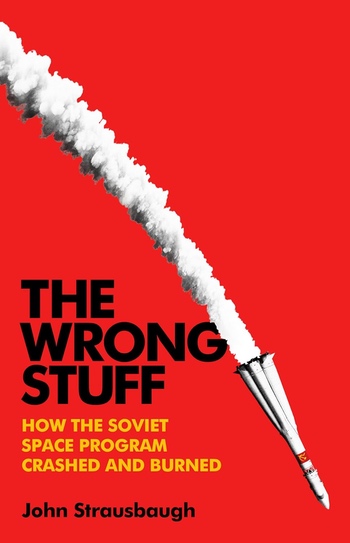Review: The Wrong Stuffby Jeff Foust
|
| Without new insights into the Soviet space program, the purpose of the book appears to be to summarize and synthesize what others have written. It is also, it seems, intended to sensationalize. |
The book seeks to be a condensed history of the Soviet/Russian space program, starting from its postwar origins developing rockets as ballistic missiles, although the primary focus (particularly after discussing Sputnik) is on the Soviet human space program in the 1960s. Those missions racked up an impressive series of firsts, but also flirted with disaster many times in a manner Strausbaugh suggests was reckless.
If you’re familiar with that era of Soviet space history, you won’t find much new in this book. That’s because, in large part, Strausbaugh relies on secondary sources like other history books on the era, based on the slender two-page bibliography; the closest things to primary sources are Boris Chertok’s Rockets and People and Yuri Gagarin’s autobiography. The book also lacks images, endnotes, and even an index, strangely enough.
Without new insights into the Soviet space program, the purpose of the book appears to be to summarize and synthesize what others have written. It is also, it seems, intended to sensationalize: the book goes into great detail about the drinking and sexual escapades of Russian cosmonauts, for example. That approach extends to the writing style, where Strausbaugh says that Khrushchev was “jonesing” for another chance to “troll the Americans” with another space first. And the program’s chief designer, Sergei Korolev, didn’t just snatch victory from the jaws of defeat with one mission, he “pried open the jaws of Defeat, stuck his head in, reached all the way down Defeat’s throat, and yanked out Victory.” One is surprised he didn’t kick Defeat in the shins as well.
There are also some odd errors in the book. In the chapter talking about Valentina Tereshkova’s flight, he references America’s “Mercury 13” and claims that none of them went to space: Wally Funk, he argues, did not go to space on a Blue Origin New Shepard suborbital flight in 2021 because it “peaked at about seventy-six kilometers, shy of the one hundred kilometers conventionally considered the edge of space.” That flight, in fact, reached an altitude of 107 kilometers, well above the Kármán Line. Late in the book, he claims that a Kazakh businessman named Dauren Musa owned the Baikonur Cosmodrome and that the Russians paid rent to him. Musa instead claims to own an abandoned Buran shuttle there (although it is true that he reportedly offered to hand it over to Roscosmos in exchange for the skull of a 19th century Kazakh leader.)
If you are completely unfamiliar with the history of the Soviet/Russian human spaceflight program, The Wrong Stuff will at least provide you with an introduction, particularly of its early history. If you’re reading this publication, though, that’s likely not the case; the book may instead fail to make it off the launch pad, with few novel insights about either the program’s past or its uncertain future.
Note: we are now moderating comments. There will be a delay in posting comments and no guarantee that all submitted comments will be posted.
